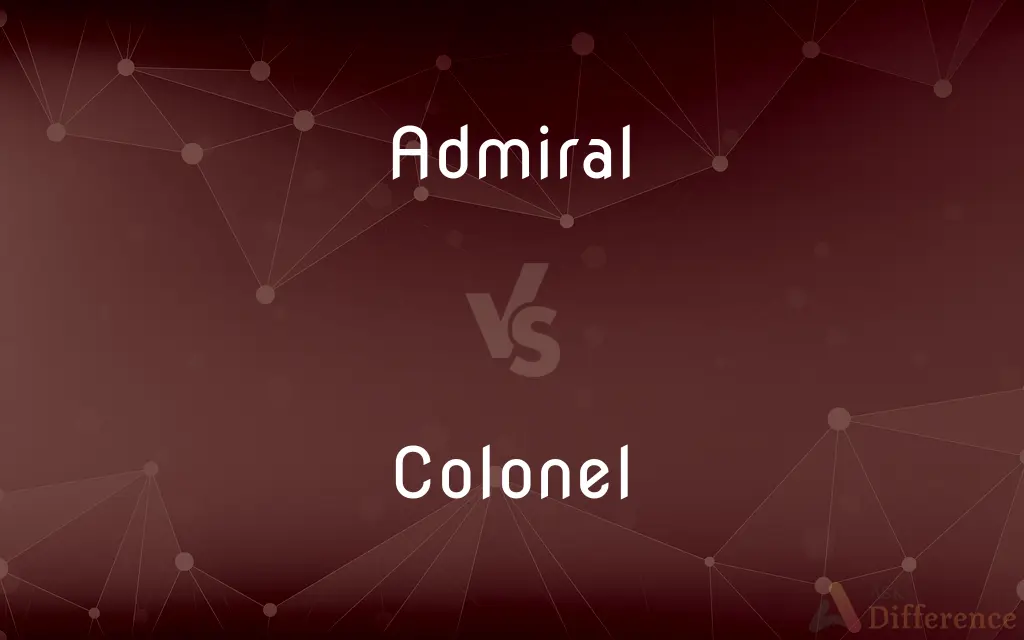Admiral vs. Colonel — What's the Difference?
By Maham Liaqat & Urooj Arif — Updated on March 19, 2024
An Admiral is a high-ranking officer in the navy, commanding large naval forces, while a Colonel is a senior military officer in the army, often commanding a regiment or brigade.

Difference Between Admiral and Colonel
Table of Contents
ADVERTISEMENT
Key Differences
An Admiral is a senior naval officer rank, often the highest in many navies, and is responsible for commanding large naval units, fleets, or entire naval operations. The rank of Admiral is associated with significant strategic responsibilities and is often involved in high-level military and defense planning. Admirals play key roles in naval strategy, operations, and often have a say in national defense matters. On the other hand, a Colonel is a senior officer rank in the army, below the rank of general. Colonels typically command units such as regiments or brigades, which consist of several battalions, making them responsible for a significant number of troops and equipment.
In terms of hierarchy, an Admiral is much higher than a Colonel, with the latter often being several ranks below in the overall military hierarchy. While an Admiral might be involved in joint chiefs of staff meetings or national defense strategy discussions, a Colonel's responsibilities are more likely to be focused on specific operational or tactical outcomes within the army's structure.
The path to becoming an Admiral involves extensive naval experience, strategic acumen, and often decades of service in various naval capacities, from commanding ships to naval bases, and participating in or leading significant naval operations. To become a Colonel in the army, one must also have a distinguished military career, with a progression through various command and staff positions, demonstrating leadership, tactical skill, and a deep understanding of army operations and strategy.
Both ranks carry significant prestige and responsibility, but their roles, spheres of influence, and the nature of their command differ greatly due to the distinct branches of the military they serve in. While Admirals engage in naval operations and strategy, influencing national and international maritime policy, Colonels are integral to the planning and execution of ground operations, playing critical roles in the success of military engagements and the overall effectiveness of the army.
Comparison Chart
Branch of Military
Navy
Army
ADVERTISEMENT
Command Level
Large naval units, fleets, entire naval operations.
Regiments or brigades, consisting of several battalions.
Hierarchy
Often the highest rank in a navy.
Senior officer rank, below the rank of general.
Responsibilities
Strategic planning, high-level military and defense planning.
Tactical decision-making, troop management, battlefield leadership.
Path to Rank
Extensive naval experience, strategic roles, decades of service.
Distinguished military career, leadership, tactical skill.
Compare with Definitions
Admiral
A high-ranking naval officer, commanding large fleets or naval operations.
The Admiral oversaw the deployment of naval forces in the region.
Colonel
A senior army officer commanding a regiment or brigade.
The Colonel led the brigade in a complex military operation.
Admiral
Commands respect and authority within the navy and defense community.
The Admiral's decades of service earned him great respect among his peers.
Colonel
Commands respect and authority within the army.
The Colonel was known for his fair but firm leadership style.
Admiral
Involved in strategic military planning and decisions.
The Admiral participated in discussions regarding national defense strategy.
Colonel
Responsible for tactical planning and troop management.
The Colonel devised a tactical plan to secure the area.
Admiral
Holds significant influence in naval and maritime matters.
The Admiral advocated for increased maritime security measures.
Colonel
Often plays a direct role in battlefield leadership and decision-making.
The Colonel's quick thinking on the battlefield saved many lives.
Admiral
Often involved in international military cooperation and diplomacy.
The Admiral represented the navy at the international naval conference.
Colonel
Involved in the development and training of subordinate officers and soldiers.
The Colonel emphasized the importance of continuous training and readiness.
Admiral
Admiral is one of the highest ranks in some navies. In the Commonwealth nations and the United States, a "full" admiral is equivalent to a "full" general in the army, and is above vice admiral and below admiral of the fleet, or fleet admiral.
Colonel
Colonel (; abbreviated as Col., Col or COL) is a senior military officer rank used in many countries. It is also used in some police forces and paramilitary organizations.
Admiral
The most senior commander of a fleet or navy.
Colonel
A rank of officer in the army and in the US air force, above a lieutenant colonel and below a brigadier or brigadier general.
Admiral
A butterfly which has dark wings with bold red or white markings.
Colonel
A commissioned rank in the US Army, Air Force, or Marine Corps that is above lieutenant colonel and below brigadier general.
Admiral
The commander in chief of a fleet.
Colonel
One who holds this rank or a similar rank in another military organization.
Admiral
A flag officer.
Colonel
An honorary nonmilitary title awarded by some states of the United States.
Admiral
A commissioned rank in the US Navy or Coast Guard that is above vice admiral and below Fleet Admiral.
Colonel
A commissioned officer in an armed military organization, typically the highest rank before flag officer ranks (generals). It is generally found in armies, air forces or naval infantry (marines).
Admiral
One who holds the rank of admiral, Fleet Admiral, rear admiral, or vice admiral.
Colonel
(intransitive) To act as or like a colonel.
Admiral
Any of various brightly colored nymphalid butterflies of the genera Limenitis and Vanessa, especially V. atalanta, having black wings with red bands.
Colonel
The chief officer of a regiment; an officer ranking next above a lieutenant colonel and next below a brigadier general.
Admiral
(Archaic) The ship carrying an admiral; flagship.
Colonel
A commissioned military officer in the United States Army or Air Force or Marines who ranks above a lieutenant colonel and below a brigadier general
Admiral
A naval officer of the highest rank; the commander of a country's naval forces.
Admiral
A naval officer of high rank, immediately below Admiral of the Fleet; the commander of a fleet or squadron.
Admiral
A flag officer in the United States Navy or Coast Guard of a grade superior to vice admiral and junior to admiral of the fleet (when that grade is used). An admiral is equal in grade or rank to a four-star general.
Admiral
The ship which carries the admiral, the flagship; also, the most considerable ship of a fleet.
Admiral
(obsolete) A prince or Saracen leader under the Sultan.
Admiral
Any of various nymphalid butterflies of the genera Kaniska, Limenitis and Vanessa, especially a red admiral or white admiral.
Admiral
A naval officer of the highest rank; a naval officer of high rank, of which there are different grades. The chief gradations in rank are admiral, vice admiral, and rear admiral. The admiral is the commander in chief of a fleet or of fleets.
Admiral
The ship which carries the admiral; also, the most considerable ship of a fleet.
Like some mighty admiral, dark and terrible, bearing down upon his antagonist with all his canvas straining to the wind, and all his thunders roaring from his broadsides.
Admiral
A handsome butterfly (Pyrameis Atalanta) of Europe and America. The larva feeds on nettles.
Admiral
The supreme commander of a fleet; ranks above a vice admiral and below a fleet admiral
Admiral
Any of several brightly colored butterflies
Common Curiosities
How does a Colonel's role in the army differ from an Admiral's in the navy?
A Colonel typically commands regiments or brigades in the army, focusing on tactical planning, troop management, and battlefield leadership, whereas an Admiral has broader strategic responsibilities in commanding naval forces.
Can a Colonel be involved in strategic planning?
While a Colonel's primary focus is on tactical decision-making and operational leadership, they may also contribute to strategic planning within their scope of command.
What is the significance of an Admiral in national defense?
An Admiral plays a key role in national defense, influencing naval strategy, operations, and policy, and often contributing to joint military and national security discussions.
How does the command of an Admiral impact international military relations?
Admirals often engage in international military cooperation and diplomacy, representing their navies in international forums, which can significantly impact military relations and maritime security policies.
What is the role of an Admiral in the navy?
An Admiral commands large naval units, fleets, or entire naval operations and is involved in strategic military planning and high-level defense decisions.
What responsibilities does an Admiral have?
An Admiral has responsibilities that include strategic planning, commanding naval operations, and participating in defense strategy discussions at the national or international level.
How does one become a Colonel in the army?
Becoming a Colonel requires a distinguished military career with progression through various command and staff positions, demonstrating leadership, tactical skill, and a comprehensive understanding of army operations.
What distinguishes the path to becoming an Admiral?
The path to becoming an Admiral involves extensive naval experience, strategic leadership roles, and decades of service in various capacities, from ship command to significant naval operations.
What role does a Colonel play in military training and readiness?
A Colonel is integral to the development and training of subordinate officers and soldiers, ensuring their units are prepared and capable of executing military operations effectively.
How does the leadership of a Colonel affect army operations?
The leadership of a Colonel directly impacts the effectiveness, morale, and success of army operations, through tactical planning, decision-making, and direct battlefield leadership.
Share Your Discovery

Previous Comparison
Indisputable vs. Unquestionable
Next Comparison
Lendees vs. SendeesAuthor Spotlight
Written by
Maham LiaqatCo-written by
Urooj ArifUrooj is a skilled content writer at Ask Difference, known for her exceptional ability to simplify complex topics into engaging and informative content. With a passion for research and a flair for clear, concise writing, she consistently delivers articles that resonate with our diverse audience.














































